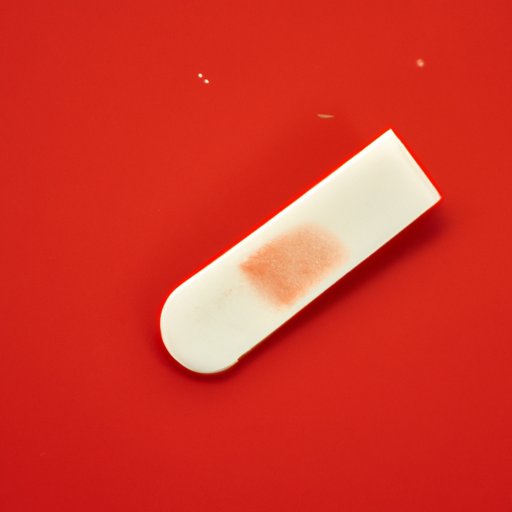
I. Introduction
One of the most annoying things to happen is getting a blister on your lip. Lip blisters are a common occurrence, and many of us have had to deal with them from time to time. They can be caused by various factors such as cold sores, injury, sunburn, or allergies. This article explores different home remedies, treatment options, preventative measures, and when to see a doctor.
II. 5 Easy Home Remedies to Get Rid of a Blister on Your Lip
Here are some natural remedies that you can use to help heal your blister:
- Tea Tree Oil: Tea tree oil has anti-inflammatory and antiviral properties that help to reduce inflammation and fight the virus causing the blister. Mix two drops of tea tree oil with one teaspoon of olive oil and apply on the blister with a cotton swab.
- Aloe Vera: Applying aloe vera gel to the blister can help speed up the healing process. Aloe vera has calming properties that help soothe and moisturize the skin. The gel can be extracted from a fresh aloe vera leaf.
- Honey: Honey is known for its antibacterial properties, which can help to prevent infection. Dab a small amount of honey on the blister and leave it for a few minutes before rinsing it off with warm water.
- Coconut Oil: Coconut oil is one of the most effective natural remedies for blisters. It contains fatty acids that moisturize and penetrate the skin, helping to speed up the healing process. Apply a small amount of coconut oil to the blister regularly.
- Baking Soda: Applying baking soda to the lip blister can help dry it out. Mix one teaspoon of baking soda with a few drops of water to form a paste. Apply the paste to the blister and let it sit for 10-15 minutes before rinsing it off.
III. Preventing and Treating Blisters on the Lips: A Comprehensive Guide
It is always better to prevent blisters from occurring than to treat them. Here are some tips that can help prevent blisters from forming:
- Hydrate: Keeping your body hydrated can help prevent lip blisters. Drink plenty of water throughout the day to keep your lips moisturized.
- Sunscreen: Using a lip balm that contains SPF can protect your lips from sun damage and prevent lip blisters from forming.
- Moisture: Keep your lips moisturized using a lip balm or vaseline. This will help prevent your lips from drying out, which can lead to blisters.
If you already have a blister, here are some treatment options:
- Cold Compress: Applying a cold compress to the blister can reduce swelling and inflammation.
- Creams: There are many over-the-counter creams and ointments that can help relieve the pain and reduce swelling
- Prescription Medication: If the blister is caused by a virus, such as herpes simplex, your doctor may prescribe antiviral medication.
IV. The Do’s and Don’ts of Popping a Blister on Your Lip
It is not always safe to pop a blister, but if you must do it, make sure you do it safely:
- Do:[/strong] Wash your hands and the blister with soap and warm water.
- Do: Use a sterilized needle or pin to puncture the blister, and gently press out the fluid inside.
- Don’t: Peel off the skin on top of the blister. This can expose the blister to infection and slow down the healing process.
- Don’t: Pop the blister if you have a weakened immune system or if the blister is in a sensitive area such as the genital area or inside the mouth.
V. When to See a Doctor About a Blister on Your Lip
Most lip blisters go away on their own without medical treatment. However, you should see a doctor if:
- The blister is very painful and is affecting your ability to eat or speak.
- The blister is larger than a quarter inch.
- The blister appears to be infected.
VI. 10 Products That Can Help Heal a Blister on Your Lip
Here are some over-the-counter treatments that can help heal a lip blister:
- Blistex Medicated Lip Balm: This lip balm helps relieve pain, itching, and burning sensations.
- Carmex Cold Sore Treatment: This product helps relieve symptoms of cold sores and blisters.
- Aquaphor Healing Ointment: This moisturizing ointment helps soothe dry and irritated skin, including lip blisters.
- Neosporin: This ointment helps prevent infection and promote healing.
- Abreva Cold Sore/Fever Blister Treatment: This cream helps reduce healing time and relieve symptoms of cold sores.
VII. My Experience with Lip Blisters and How I Finally Overcame Them
As someone who has dealt with lip blisters for years, I know how painful and frustrating they can be. What worked for me was a combination of natural remedies such as aloe vera and coconut oil, and over-the-counter creams such as Abreva. The most important thing is to treat the blister promptly and avoid popping it.
VIII. Conclusion
Lip blisters can be uncomfortable and unsightly, but there are many ways to get rid of them. Home remedies like tea tree oil and aloe vera can provide relief. Preventative measures such as sunscreen and hydration can help prevent blisters from forming. If you do get a blister, make sure you do not pop it, and if you must, do it safely. Remember, if the blister is very painful, infected or larger than a quarter inch, consult a doctor. Keep trying different remedies until you find one that works for you and be patient.




